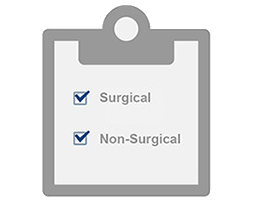Frequently Asked Questions
What is the relationship between prostate cancer treatment and stress urinary incontinence?
Is there a typical treatment pathway for men suffering from stress urinary incontinence?
Does my private health insurance cover the cost of stress urinary incontinence surgery?
The Prostheses List which is released by the Department of Health includes medical devices that are intended for long term use. A private health insurer is required to pay the reimbursement amount for any device listed on the Prostheses List when a patient has appropriate health insurance cover so there is no out-of-pocket cost to the patient for the medical device. Most private health funds (and/or Medicare) cover the medically necessary diagnosis and treatment of male stress urinary incontinence. Dependent on the patient’s level of private health cover, there may be some expenses incurred not reimbursed by the health fund. Professional fees for surgeons, surgical assistants and anaesthetists and hospital fees may vary. Private health insurance will largely cover these costs. Experienced prosthetic urologist will provide their patients with informed financial consent.
How should I approach my private health insurance about stress urinary incontinence surgery?
Here are some important steps a patient can take to minimise the chances of an improperly processed or denied claim:
- Read your insurance policy. It’s better to know what your insurance company will cover or require before you receive a service.
- If you still have questions about your coverage, call your insurance company and ask a representative to explain it.
- Remember your insurance company, not your doctor, makes decisions about what will be paid for and what will not.
No private health insurance. Have you considered self-financing?
Patients with no private health insurance cover, can choose to self-finance. To self-finance a detailed description of the out-of-pocket costs should be obtained from the urologist. The costs will vary based on a number of items starting with where (which hospital) you plan to have your surgery performed.
Australian Veteran?
Any patient that falls under Veterans Affairs policies will have the total cost of the surgery covered by the Commonwealth Government.
Next steps
To avoid delays in payment or reimbursement, work with your urologist’s office and health fund to verify coverage and reimbursement payment levels before beginning a treatment path.
![]()
Take the Quiz
Take our quiz to identify if you are experiencing urinary incontinence symptoms and help kick-start the conversation with your doctor.
Questions to Ask
Helpful hints on how to start the conversation with your GP or urologist, and other useful resources.
Results from case studies are not necessarily predictive of results in other cases. Results in other cases may vary. All images are the property of Boston Scientific. All trademarks are the property of their respective owners.
Disclaimer: Individual symptoms, situations, circumstances and results may vary. This information is not intended to be used for medical diagnosis or treatment or as a substitute for professional medical advice. Please consult your doctor or qualified healthcare provider regarding your condition and appropriate medical treatment.
These Videos are meant for informational purposes only and may not be indicative of clinical outcome. The opinions, procedures and patient care policies expressed or depicted in the videos are those of the physician or practice nurse and do not necessarily reflect the opinions, policies or recommendations of Boston Scientific Corporation or any of its employees.
This site is intended for Australian residents only. Please review the Boston Scientific Privacy Policy, for practices on the collection, storage, use and disclosure of your personal information.
CAUTION : Indications, contraindications, warnings and instructions for use can be found in the product labelling supplied with each device.






